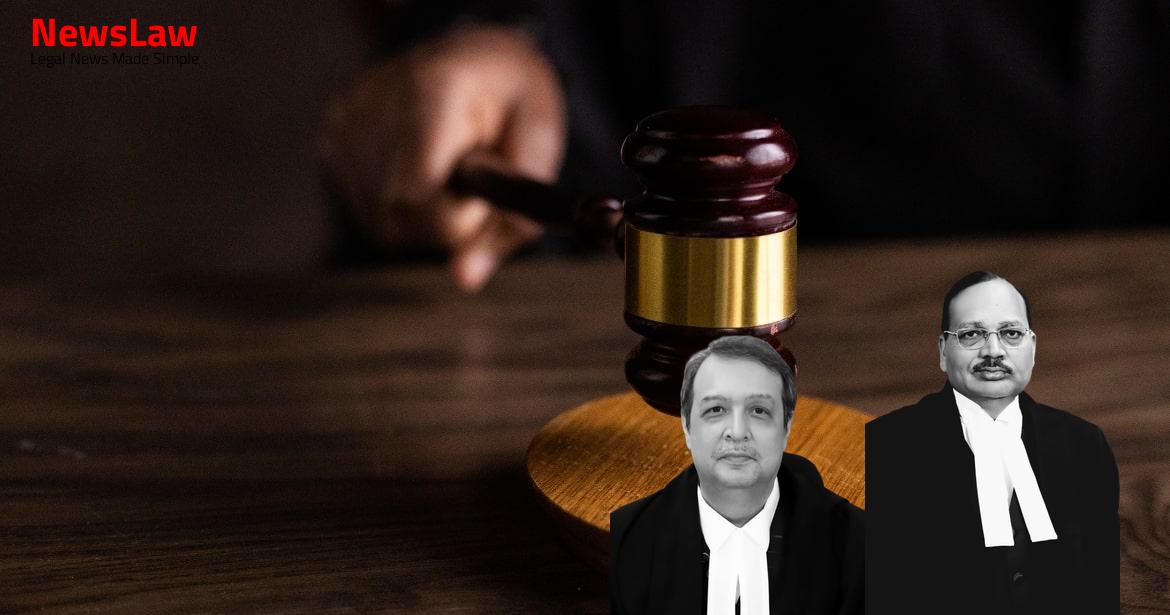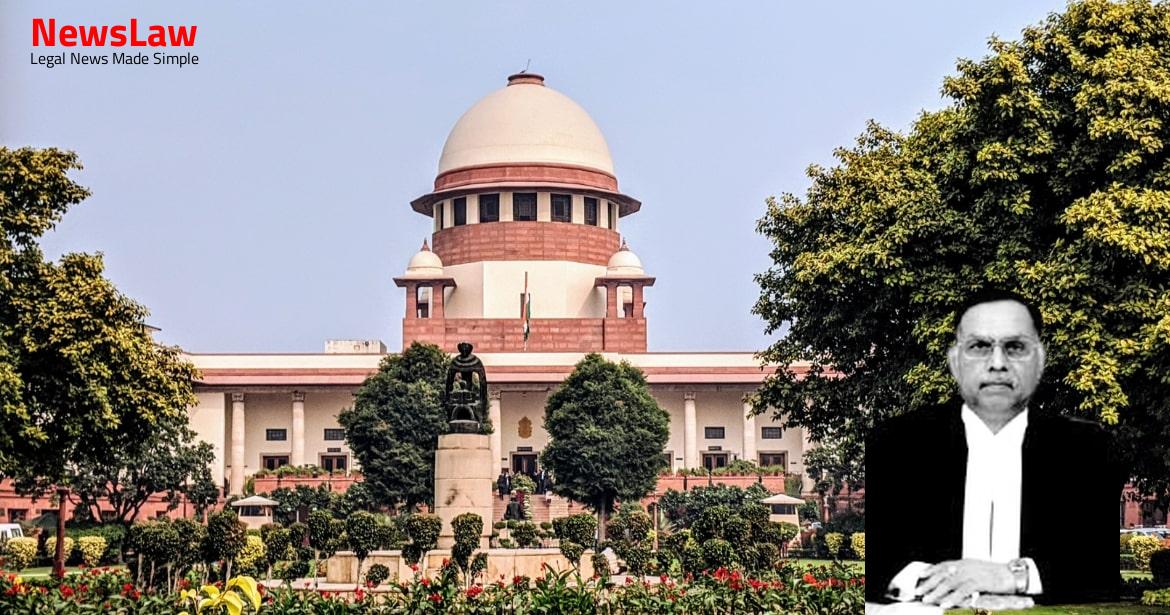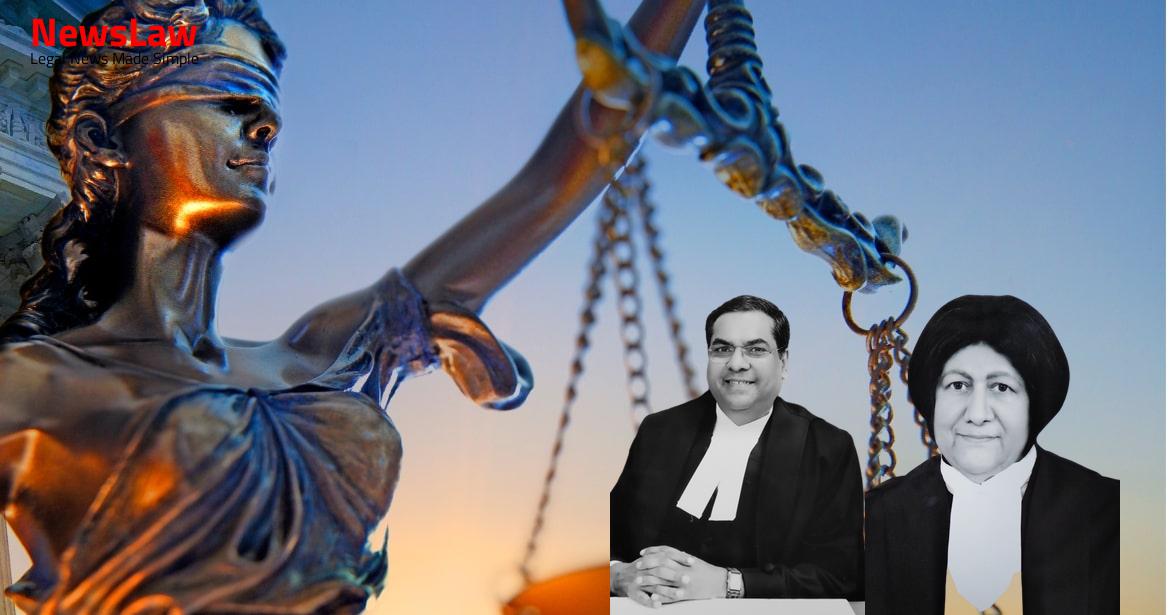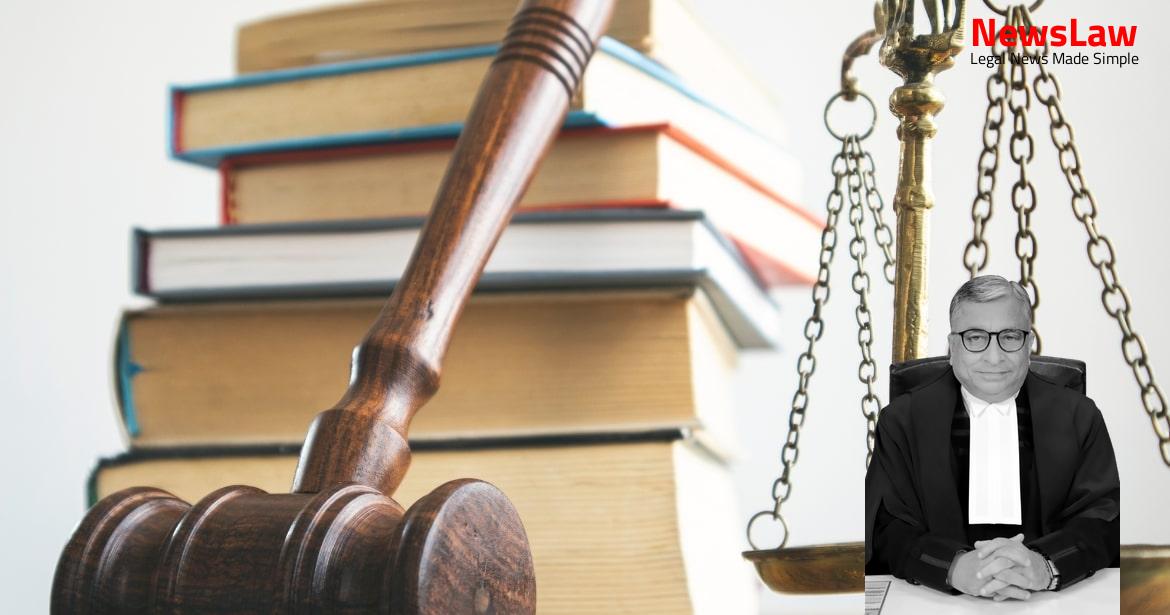Delve into a complex legal case where the court grapples with the delicate balance between individual rights, public order, and religious beliefs. The analysis of exhumation requests in the context of a deceased son’s case sheds light on fundamental rights under the Constitution, highlighting the fine line courts must tread to uphold justice and uphold legal principles.
Facts
- The appeal was filed against the judgment and order passed by the High Court of Jammu & Kashmir and Ladakh at Srinagar.
- The Appeal Court modified the judgment and order passed by the Single Judge of the High Court.
- The modification allowed the appellant and his family members to disinter the body/remains of the deceased from the graveyard.
- The Single Judge of the High Court had initially allowed the writ application for disinterment.
- The Union Territory of Jammu & Kashmir and others challenged the Single Judge’s order by filing the Letters Patent Appeal.
- The appellant approached various authorities to request the body of his deceased son, who was identified as a militant killed in an encounter.
- The bodies of the deceased militants were buried, with two bodies handed over to their relatives for last rites while two others, including the appellant’s son, were not exhumed.
- The appellant’s request for exhumation of his son’s body was opposed by authorities citing security, public health, and order concerns.
- The court allowed the appellant and his family to perform religious rituals at the grave but denied the exhumation request, noting the body was buried as per customs and public health concerns.
- Authorities argued against exhumation to prevent a trend of glorifying deceased terrorists, citing past instances such as that of Burhan Wani.
- The counsel for respondents argued against the appeal, stating there was no merit and it should be dismissed.
Issue
- The appeal court considered the fundamental right of the appellant to perform the last rites of his slain son under Article 21 of the Constitution.
- The court questioned the feasibility of exhumation after more than eight months for performing rituals in Islam.
- The compensation awarded to respondent no. 1 for the deprivation was deemed appropriate by the court.
Arguments
- Mr. Grover, the appellant’s counsel, argues that the Appeal Court should not have disturbed the order for exhumation passed by the Single Judge.
- The appellant wishes to wash the body with water and wrap it in a new white cloth before re-burial.
- Due to not being allowed to perform the last rites of his son, the appellant seeks exhumation of the body.
- Mr. Grover cites various legal precedents to support his arguments for exhumation.
- The appellant’s fundamental right under Article 21 to perform the last rites of his son in accordance with Islamic rituals is emphasized.
- The respondents justify their decision not to hand over the body based on public interest and maintenance of law and order.
- The Advocate General argues that the writ court misinterpreted the situation and suggests allowing Fatiha Khawani prayers at the grave of the deceased under security measures.
- The appellant believes his son was not a terrorist and should have been given the body for proper burial.
- Mr. Grover seeks permission for the family to perform prayers/rituals after exhumation, with a commitment to follow all conditions imposed by the respondents.
- Respondents tried to draw a distinction by stating that the deceased son of the petitioner was a confirmed terrorist, while the other two killed were only associates of terrorists.
- The petitioner’s request to hand over the body of his son for cremation or burial was arbitrarily denied by the respondents, citing reasons related to public order.
- The respondents have a history of not handing over bodies of terrorists killed in encounters to their next of kin to prevent worsening of law and order situations.
- Counsel for the respondents argued that the High Court’s order was balanced, considering public order issues, and no interference is warranted from the Supreme Court under Article 136 of the Constitution.
- The counsel contended that the appellant, as the father of the deceased, does not have a fundamental right under Article 21 to seek exhumation for performing necessary rituals.
- The respondents have not provided a clear reason as to why the bodies of Altaf Ahmad Bhat and Dr. Mudasir Gul were exhumed and handed over to their relatives for last rites, while the petitioner’s similar request was denied.
Also Read: Supreme Court Judgment:
Supreme Court Upholds Benefit of Input Tax Credit in Uttar Pradesh Value Added Tax Act 2008
Analysis
- The fundamental rights under Articles 25 and 26 are subject to public order.
- The right to dignity and fair treatment under Article 21 applies even after death.
- Judicial power can determine essential religious practices under Articles 25 and 26, subject to public order, morality, and health.
- Religious rights are circumscribed and must be enjoyed within constitutionally permissible parameters.
- Legislative vacuum exists regarding exhumation for performing religious ceremonies and burial.
- The right to have a decent burial is considered part of the right to dignity under Article 21.
- Rights related to performing last rites are akin to fundamental rights under Article 21.
- Family rights to perform religious rites before cremation/burial are protected under Article 21.
- Public order, morality, and health can limit religious rights under Articles 25 and 26.
- Article 136 provides wide discretionary power for the Supreme Court to intervene in suitable cases.
- The court examines the judicial process and discretion involved in granting special leave under Article 136.
- The court emphasizes the need for fair procedure and adherence to established judicial principles.
- Special leave under Article 136 is to be granted sparingly and in exceptional cases only.
- The court is vested with wide discretionary power under Article 136 but should exercise it with caution.
- Consideration of public order, national security, and grave injustice are crucial factors in granting special leave.
- The sanctity of the grave is upheld by the law, and disinterment is generally discouraged except in special circumstances.
- The court highlights the importance of maintaining dignity and respect for the deceased, even in legal proceedings.
- Traditional practices, religious beliefs, and cultural norms are essential considerations in matters concerning the deceased.
- The court underscores the need for a uniform standard in granting special leave across various types of cases.
- The State must allow the body of a deceased person to be treated with dignity unless necessary for criminal investigation, establishing cause of death, or for scientific or medical purposes.
- Exhumation may be permitted in cases of suspicion of foul play or for public health concerns, but it goes against the moral principle of letting the dead ‘rest in peace’.
- Exhumation requests typically fall into two categories: public interest and personal reasons.
- The lawful authority for exhumation is provided in Section 176(3) of the CrPC, 1973.
- The Supreme Court has the power under Article 136 of the Constitution to grant special leave in its discretion against any judgment, decree, determination, sentence, or order.
- If a body is highly putrefied and poses a risk to public health, last rites may be performed in the graveyard itself according to tradition and religious beliefs.
- Even after filing a petition of special leave to appeal, the judgment, decree, or order remains final, effective, and binding unless the Court stays or suspends its operation.
- Consider enacting legislation on exhumation to address similar situations.
- The relief granted by the High Court in para 21 of the judgment is just, proper, and equitable.
Decision
- The appellant, father of the deceased, is dissatisfied with the High Court’s order and has filed an appeal invoking Article 136 of the Constitution.
- The father is seeking compensation of Rs. 5 lakhs for being deprived of his right to bury his son according to family traditions and religious beliefs.
- The court notes that the deceased’s body is likely in an advanced stage of putrefaction and urges prompt action from the respondents.
- The appeal is dismissed with no costs, and pending applications are also disposed of.
- The court allows the petition of the father of the deceased, directing the respondents to arrange for exhumation of the body from Wadder Payeen graveyard.
- The respondents are instructed to transport the body to the petitioner’s village for burial according to the deceased’s religious faith and traditions.
- The respondents must comply with the directions given by the High Court regarding the matter.
Case Title: MOHAMMAD LATIEF MAGREY Vs. THE UNION TERRITORY OF JAMMU AND KASHMIR (2022 INSC 947)
Case Number: C.A. No.-006544-006544 / 2022



